Jacob Wilkinson (c. 1722-1799) was an English businessman who served as an MP and as a director of the East India Company.
Contents

Jacob Wilkinson (c. 1722-1799) was an English businessman who served as an MP and as a director of the East India Company.

According to Sir Lewis Namier, he was a Presbyterian from Berwick-upon-Tweed who became rich as a businessman and banker in London. By 1757 he was appearing in commercial directories and by 1759 was a substantial investor in government stock. [1]
At some point he also acquired lands and slaves in the West Indies, at his death holding the estate of Hoghole in the parish of St Thomas-in-the-Vale on Jamaica and another estate on Tobago. [2]
He retained links with his birthplace, where in 1765 he was mentioned as a political opponent of Hugh Percy, 1st Duke of Northumberland's supporters and in the general election of 1774 came top of the poll, becoming MP for Berwick-upon-Tweed in the Parliament of Great Britain. He did not stand again in the 1780 general election, but in 1781 won a seat at Honiton. [1]
While sitting, he also sought election as a director of the East India Company, which he achieved in 1782. However, when the government in 1783 proposed greater parliamentary control over the activities of the Company, Wilkinson resigned his directorship. He did not stand again in the general election of 1784, so ending his political career. [1]
He died at his home in Bedford Row, Holborn, on 24 June 1799. [3] He was buried at St Mary's churchyard in Watford, Hertfordshire. The inscription reads, "Here lie the Remains of JACOB WILKINSON Esq Late of Grove Mill in this Parish, and an Old and Respectable Merchant of the City of London. He departed this life... on the 24th June 1799, Aged 76 Years..." (History of Hertfordshire, Vol 3 - Cussans, 1881)
With his wife Ann, who survived him, he had ten children between 1761 and 1779. In his will, made on 10 August 1798 and proved on 18 July 1799, he appointed as his executors two of his sons, Thomas Wilkinson (1762-) and Daniel Wier Wilkinson (1778-1800), together with John Bourdieu (1763-1825), husband of his deceased daughter Ann (1766-1798). In addition to generous legacies to all these, he left large sums to his third surviving son Hugh Wilkinson (1779-) and to his three surviving daughters, Mary Ann Wilkinson (1764-), Elizabeth Wilkinson (abt 1768-) and Fanny Wilkinson (1776-1812). [2]

John Barrington, 1st Viscount Barrington, known as John Shute until 1710, was an English dissenting theologian and Whig politician who sat in the House of Commons from 1715 to 1723.

John Fuller, better known as "Mad Jack" Fuller, was Squire of the hamlet of Brightling, in Sussex, and politician who sat in the House of Commons between 1780 and 1812. He was a builder of follies, philanthropist, patron of the arts and sciences, and slave owner and a supporter of slavery. He purchased and commissioned many paintings from J.M.W. Turner. He was sponsor and mentor to Michael Faraday.
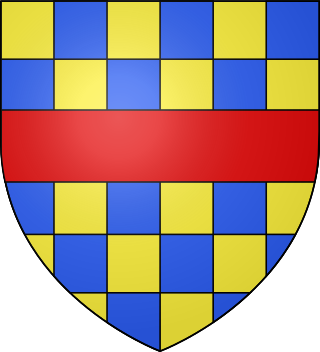
Hugh Clifford, 3rd Baron Clifford of Chudleigh of Ugbrooke House near Chudleigh in Devon, was a peer.
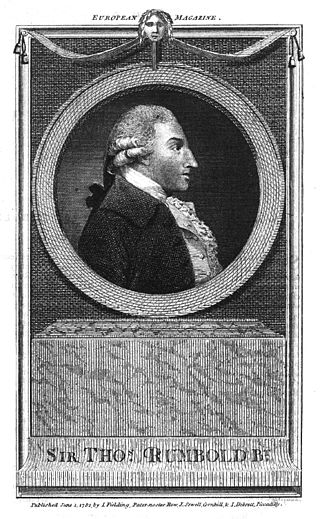
Sir Thomas Rumbold, 1st Baronet was a British administrator in India and politician who sat in the House of Commons between 1770 and 1790. He served as Governor of Madras from 1777 to 1780. He became infamous for his corruption and, for in effect stealing, the ring of the Nawab of Arcot. He brought home from India 1.5 million pagodas or about £600,000 and was a classic example of a nabob. Attempts were made to investigate the misdemeanour by Henry Dundas but the case did not make much headway.

Richard Pennant, 1st Baron Penrhyn, was a Welsh politician and nobleman who served as an MP in the British Parliament, representing Petersfield and Liverpool for 29 years between 1761 and 1790. He was the owner of Penrhyn Castle, an estate on the outskirts on Bangor, North Wales.

Sir Stephen Lushington, 1st Baronet, of South Hill Park in Easthampstead, Berkshire, was an English Member of Parliament and Chairman of the East India Company.
Grey Neville of Billingbear, Berkshire was an English landowner and politician who sat in the English House of Commons from 1705 to 1708 and in the British House of Commons between 1708 and 1723.
The 1941 Berwick-upon-Tweed by-election was a parliamentary by-election held on 18 August 1941 for the British House of Commons constituency of Berwick-upon-Tweed.
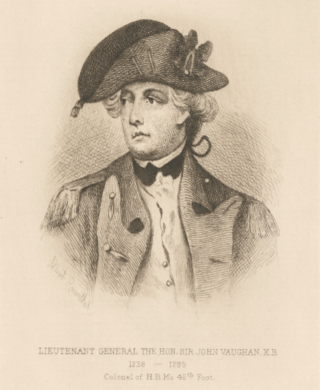
Lieutenant-General Sir John Vaughan KB, styled The Honourable from 1741, was a British soldier and a Member of Parliament in both the British and Irish Parliaments. During the American Revolutionary War he served in both the American and West Indies theaters.
George Pitt, 2nd Baron Rivers was a British nobleman and politician.
Thomas Lucas (c.1720–1784) MP, was a West India merchant, treasurer of Guy's Hospital 1764–1774 and then president of its board of governors until his death.
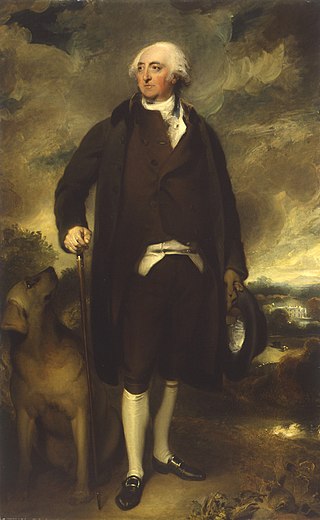
John Hunter was a British 'nabob' who became wealthy as a result of trading with India, and subsequently went into politics as deputy chairman of the East India Company and as Member of Parliament (MP) for Leominster.
Evan Baillie was a Scottish slave-trader, merchant and landowner in the West Indies. He was a Whig politician who sat in the House of Commons from 1802 to 1812.

Sir Alexander Allan, 1st Baronet was a British painter and politician.

Sir Robert Furnese, 2nd Baronet, of Waldershare, Kent, and Dover Street, Westminster, was an English Whig politician who sat in the British House of Commons from 1708 to 1733.
Charles Mellish was a British lawyer and politician who sat in the House of Commons from 1774 to 1784.

Richard Stevens (1702–1776) of Winscott in the parish of Peters Marland, Devon, was Member of Parliament for Callington in Cornwall (1761–1768).
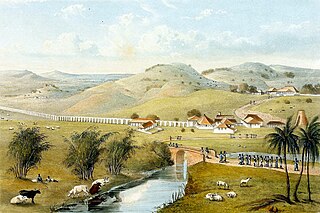
Nathaniel Bayly (c.1726–1798) was an English owner of West Indies plantations and a politician who sat in the House of Commons from 1770 to 1779.

George Wrighte (c.1706–1766), of Gayhurst House, Buckinghamshire, and Brooksby Hall, near Leicester was a British landowner and Tory politician who sat in the House of Commons for 39 years from 1727 to 1766.
Jacob Houblon, of Hallingbury, Essex, was a British landowner and Tory politician who sat in the House of Commons between 1735 and 1768.